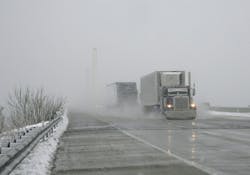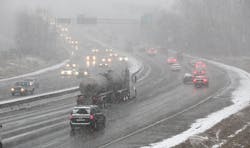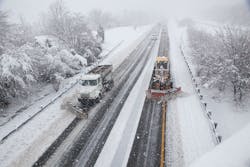We talk a lot about “big data” in the trucking business these days: how to use data to save fuel; plan more efficient routes; even how to generate more profits.
But how about using big data to mitigate the effects of “big weather”?
Some fleets are already doing this – one of Fleet Owner’s 2015 fleet of the year award winners, Transport America, already leads the way in this area – but how about more broadly-offered systems for trucking firms to tap into?
AccuWeather is one service provider putting together just such a package through its AccuWeather Enterprise Solutions forecasting system – a system Mark Ebel, the company’s vice president of business services, told me offers an average of 24.6 minutes of lead time with a “false alarm” rate of only 11% to warn truck drivers about sudden weather incidents such as roads closed due to flooding, snowstorms, and the like so they can stop or re-route – keeping them safe and their freight moving on time.
“Let’s talk about safety in trucking and logistics for a minute,” he explained to me.
“If you are travelling from Point A to Point B, you want to know what potential dangers might lay ahead on your route – and that of course includes weather hazards,” Ebel noted. “We’re monitoring those routes with our system and can offer weather alerts that allow for re-routing. That’s a time savings for freight shipments, certainly, but the safety issue is more important: you are protecting your driver and your equipment from possible harm.”
He stressed that severe weather is simply not something that can easily be planned for in advance, with events such as flash floods, high winds or tornadoes putting the life of a truck driver and the delivery of goods in jeopardy.
AccuWeather also shared some statistics compiled by the U.S. Department of transportation to highlight the threats posed by severe weather conditions to trucking:
- Each year trucking companies lose an estimated 32.6 billion vehicle hours due to weather-related congestion in 281 of the nation's metropolitan areas.
- Nearly 12%t of total estimated truck delay is due to weather in the 20 cities with the greatest volume of truck traffic.
- The estimated cost of weather-related delay to trucking companies ranges from $2.2 billion to $3.5 billion dollars annually.
So where does big data play a role in all of this? Ebel said that AccuWeather relies on a dedicated team of about 100 meteorologists using a proprietary computer modeling and system that “synthesizes” more than 20 terabytes of data to generate over 100 global forecast models. The firm’s meteorological team then evaluates those forecasts using experience and “pattern recognition ability” to provide more detail, in turn generating thousands of local, regional and national weather forecasts.
This information, in turn, can be disseminated via a range of technologies including mobile platforms, Ebel said – speeding up delivery to those who need them (think truck drivers and dispatchers here) so they can make better and faster decisions regarding potentially hazardous weather conditions.
This isn’t just saying “hey there’s a potential tornado up ahead so be careful” to drivers and dispatchers while wishing them good luck. The way Ebel described it, these are “granular,” almost minute-by-minute forecasts.
He pointed to AccuWeather’s work at a Pearl Jam concert two years ago as an example: a thunderstorm would hit the concert venue at the expected 8 pm concert start time and by 8:20 pm would be causing lightning strikes. But by 8:42 pm that storm would move off, with clear weather moving into the area. Thus the band delayed its concert start time by an hour to ensure the safety of its fans.
Such “hyper local” forecasting can be used in trucking to monitor the severity of weather and how operations need to change due to it, Ebel noted.
For example, rain might be severe enough for an hour on one route to necessitate a driver slowing down to 50 mph. But after that, the weather shifts to light rain, so highway speeds of 65 mph become safe again.
“So it’s not just about getting weather forecasts to tell you just to stop or not; maybe it’s safe to drive but just at slower speeds,” Ebel emphasized.
Ebel added that AccuWeather also draws on 50 years of weather data recorded at almost every location in North America, at 300 different altitude points, to do some “forward modeling” concerning the weather characteristics of certain stretches of road.
“Small fractional changes in humidity in some areas can generate heavy fog; and sometimes if there’s even a little rain, say a quarter-inch, that fog can last for several hours,” he noted. “So now you know if your route traverses certain points, you can tell a driver it’s an area prone to fog events even in it rains lightly – leading to traffic congestion.”
In another case, such historical weather analysis determined that a particular hill along one state turnpike iced up much faster than thought, leading to the faster deployment of salt spreading crews earlier compared to prior years, Ebel said.
“This is the kind of real-world weather information that will help protect drivers and cargo better on the road going forward,” he noted.


